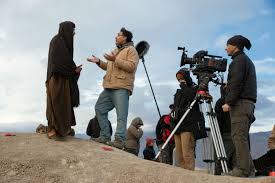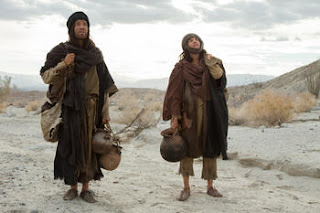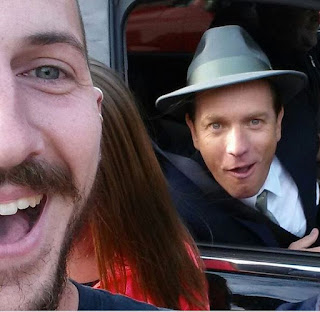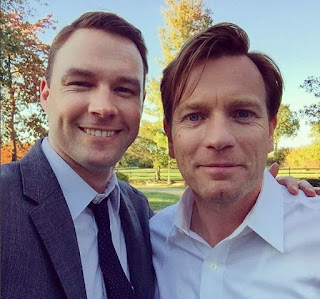Here Is Danny Boyle’s Promise ThatTrainspotting 2 Will Be Worth It
Danny Boyle is currently making the rounds to discuss his terrific new movie Steve Jobs, but while chatting with Vulture, I couldn’t let the filmmaker promote his current project without first setting my mind at ease about one to come. Boyle next intends to make a sequel to his unforgettable 1996 film Trainspotting, and as enticing as it is to imagine Ewan McGregor, Robert Carlyle, and all the rest returning to their roles as smack-addicted Scottish lowlifes, I confessed to Boyle that I was a little apprehensive about a 20-years-later look. Is it really possible to recapture the magic of a movie that was so specifically tied to its time and place?
“The actors were very fearful about a sequel as well!” admitted Boyle. “Actors are a great barometer of whether something is worthwhile or not. Their bullshit filter is very, very strong, because they’re going to be the ones out there trying to make a script look truthful and believable. When it comes to doing another Trainspotting, they were very nervous, because for all of them, it’s a large part of their reputation and they feel very protective towards their character.”
It’s that bullshit filter that stopped a potential Trainspotting sequel from getting off the ground ten years ago, when a first attempt to revisit those characters produced what Boyle called a mediocre script. “I never even sent it to the actors, because I knew they would destroy it,” he said. But last year, Boyle convened a week-long ideas summit in Edinburgh with the original film’s producing team, plus screenwriter John Hodge and author Irvine Welsh (whose book the first film was based on), and the resulting Hodge-authored screenplay got the whole team buzzing. “You just knew,” said Boyle. “It had this feeling about it, where it honors the original and it won’t disappoint people. It’s not the same film, but it can’t be, and we wouldn’t want it to be. And the actors all responded to it as I thought they would.”
Some directors treat actors like cattle, but Boyle clearly loves them and values their contributions. Ask him to discuss Kate Winslet — who anchorsSteve Jobs as bespectacled Mac marketing guru Joanna Hoffman, the only woman able to keep the arrogant Jobs (Michael Fassbender) in check — and Boyle beams as he recalls how aggressively Winslet pursued the part. Originally, Boyle and screenwriter Aaron Sorkin were talking to Natalie Portman to play Hoffman, but after negotiations fell through, Winslet sent producer Scott Rudin an unsolicited, unrecognizable picture of herself dressed up as the bespectacled Hoffman. “Scott said, ‘Do you realize who this is?’ and Aaron said, ‘Yeah, it’s Joanna Hoffman,’” laughs Boyle. “Scott said, ‘No, it’s Kate.’ And Aaron said, ‘Oh, yeah, Cate Blanchett! I knew it was her.’”
To hear Boyle tell it, he’d rather hire an actress who’s obsessed with the role than one he must labor to convince. “When an actor gets the bit between their cheeks and tells you, ‘Give me that fucking part,’ then you know they have an angle on it,” he said. “They see something in it that only actors can see. They scramble their lives to get at it.” Once production began, Winslet proved to be as much of a calming mediator as Hoffman herself. “I’d heard great things about her, how she’s a great partner on a film, and she is,” said Boyle. “She’s got my back, and she’s got Michael’s back. Any problems on the set, she’s a healer.”
And Boyle needed it. No movie is easy to mount, but Steve Jobs proved unusually tricky: The movie almost fell apart after Sony refused to move forward on it, actors like Leonardo DiCaprio and Christian Bale were reportedly dissuaded from making the film after Jobs’s widow convinced them it would damage his legacy, and the struggle to fill the titular part went public after the Sony hack revealed emails in which Sorkin, Rudin, and other creatives debated Fassbender’s castablity. “It was so bizarre!” said Boyle. “It might have looked like one of those films that could be cursed, the way some projects are.” Still, Boyle couldn’t be stopped. “To be very clear, there was a lot of stuff going on, but we just kept our heads down and tried to keep working,” he said, praising the studio that picked up the film after Sony passed: “It’s an amazing tribute to Universal, actually. They knew there were problems, and they came in and they had that same sort of steadfastness.”
Did Boyle ever have second thoughts or consider moving on to another project, given how much of a stacked deck
Steve Jobs seemed to face? “There was nothing that happened that made me doubt how important it was to make the film, and it was important that it was not going to get blown sideways by these other events,” said Boyle, who's now cruising into the fall season with
an award-worthy vehicle racking up huge numbers in limited release. “If the movie had been destroyed, it would have hurt, but it would not have been for want of our trying to protect it.”

















































